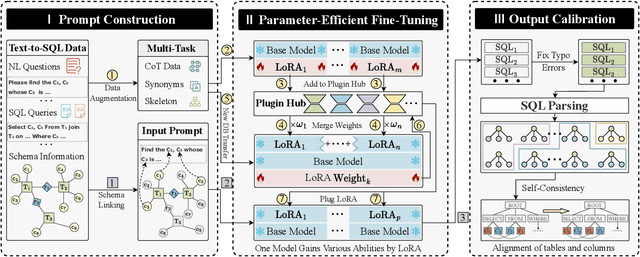Yijiang Fan
G-Boost: Boosting Private SLMs with General LLMs
Mar 13, 2025Abstract:Due to the limited computational resources, most Large Language Models (LLMs) developers can only fine-tune Small Language Models (SLMs) on their own data. These private SLMs typically have limited effectiveness. To boost the performance of private SLMs, this paper proposes to ask general LLMs for help. The general LLMs can be APIs or larger LLMs whose inference cost the developers can afford. Specifically, we propose the G-Boost framework where a private SLM adaptively performs collaborative inference with a general LLM under the guide of process reward. Experiments demonstrate that our framework can significantly boost the performance of private SLMs.
FinSQL: Model-Agnostic LLMs-based Text-to-SQL Framework for Financial Analysis
Jan 19, 2024



Abstract:Text-to-SQL, which provides zero-code interface for operating relational databases, has gained much attention in financial analysis; because, financial professionals may not well-skilled in SQL programming. However, until now, there is no practical Text-to-SQL benchmark dataset for financial analysis, and existing Text-to-SQL methods have not considered the unique characteristics of databases in financial applications, such as commonly existing wide tables. To address these issues, we collect a practical Text-to-SQL benchmark dataset and propose a model-agnostic Large Language Model (LLMs)-based Text-to-SQL framework for financial analysis. The benchmark dataset, BULL, is collected from the practical financial analysis business of Hundsun Technologies Inc., including databases for fund, stock, and macro economy. Besides, the proposed LLMs-based Text-to-SQL framework, FinSQL, provides a systematic treatment for financial Text-to-SQL from the perspectives of prompt construction, parameter-efficient fine-tuning and output calibration. Extensive experimental results on BULL demonstrate that FinSQL achieves the state-of-the-art Text-to-SQL performance at a small cost; furthermore, FinSQL can bring up to 36.64% performance improvement in scenarios requiring few-shot cross-database model transfer.
 Add to Chrome
Add to Chrome Add to Firefox
Add to Firefox Add to Edge
Add to Edge